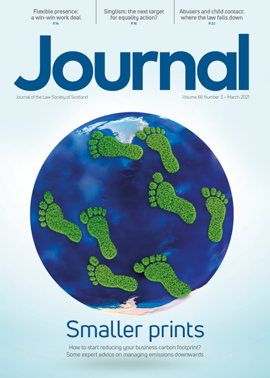Editorial: March 2021
Spring is in the air, at least when the sun is shining, and as the sap starts to rise, so emotionally most of us look forward to (hoped for) good months ahead.
With it, this year, totally understandably, comes a growing desire, if not impatience, to be free of the restrictions that have added to the mental burden of the winter months, on top of what we endured last year.
Therein lies a difficult issue for government, reflected in a sharp division of public opinion. On the one hand there are those who argue that COVID cases are declining, most people in the vulnerable groups have been vaccinated, and individuals’ wellbeing and significant sectors of the economy will both suffer perhaps irretrievable damage if there is not an early return to near normality. On the other, many respond that we have made the mistake of downplaying the risks before, a large proportion of the population are still capable of catching and spreading the virus, the vaccine is in any event not an absolute shield and you cannot isolate vulnerable people from the rest of society, and the claimed choice between health and the economy is a false one.
For what it’s worth, in my view those last points are the clinchers. There is no question that individual liberty has been seriously compromised during the pandemic, to an extent that would previously have been considered unthinkable. But if a mutating virus is still at large, to whose benefit is it if we encourage activities that could yet reverse recent improvements in infection and death rates?
Easy answers there are not, and a judgment call has to be made as to the point at which freedoms can be increased without risking a rise in serious illness that would also re-burden our health service when it is due some much needed recovery time. But even that is not the end of the story.
At that point also, if not before, we must not lose sight of the needs of those whose livelihoods will remain at risk for a longer period due to their working lives and/or personal finances being thrown into disarray – many of them with no resources to fall back on. Emergency protections have been in place regarding housing rights, debt enforcement, welfare benefits and more, and the transition out of these will bring equally pressing questions. Lawmakers and policy makers alike have a heavy responsibility to ensure that the disadvantaged are not left behind in the rush to restart. The first announcements of support measures continuing through the summer are encouraging, but they need to evolve into a properly woven, and probably continuing, safety net.
Perspectives
Features
Briefings
- Civil court: Nuts and bolts issues
- Corporate: The limits of reflective loss
- Intellectual property: rights in employee creations
- Agriculture: Allowing tenants to leave for value
- Family: Teaming up to Zoom in on marriage
- Data protection: EU transfers flow for a little longer
- Scottish Solicitors' Discipline Tribunal
- Property: Access by prescription: challenge of proof
- In-house: Moving in-house as an NQ
In practice
- New AML guidance: what you need to know
- Schools outreach: a virtual revolution
- The Word of Gold: The joy of cheques
- Wills and executries: learning the hard way
- OPG update
- The Eternal Optimist: No going back
- Handling police complaints: seeking fitness for purpose
- Profile: Christine O’Neill QC
- Ask Ash: Double demands






